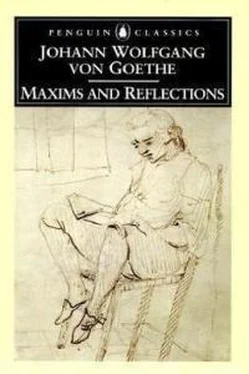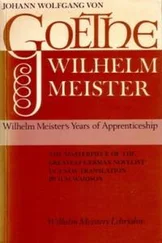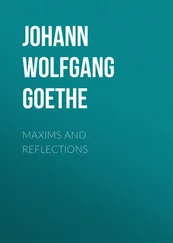39
Defects are perceived only by one who has no love; therefore, to see them, a man must become uncharitable, but not more so than is necessary for the purpose.
40
The greatest piece of good fortune is that which corrects our deficiencies and redeems our mistakes.
41
Reading ought to mean understanding; writing ought to mean knowing something; believing ought to mean comprehending; when you desire a thing, you will have to take it; when you demand it, you will not get it; and when you are experienced, you ought to be useful to others.
42
The stream is friendly to the miller whom it serves; it likes to pour over the mill wheels; what is the good of it stealing through the valley in apathy?
43
Whoso is content with pure experience and acts upon it has enough of truth. The growing child is wise in this sense.
44
Theory is in itself of no use, except in so far as it makes us believe in the connection of phenomena.
45
When a man asks too much and delights in complication, he is exposed to perplexity.
46
Thinking by means of analogies is not to be condemned. Analogy has this advantage, that it comes to no conclusion, and does not, in truth, aim at finality at all. Induction, on the contrary, is fatal, for it sets up an object and keeps it in view, and, working on towards it, drags false and true with it in its train.
47
The absent works upon us by tradition. The usual form of it may be called historical; a higher form, akin to the imaginative faculty, is the mythical. If some third form of it is to be sought behind this last, and it has any meaning, it is transformed into the mystical. It also easily becomes sentimental, so that we appropriate to our use only what suits us.
48
In contemplation as in action, we must distinguish between what may be attained and what is unattainable. Without this, little can be achieved, either in life or in knowledge.
49
'Le sense commun est le génie de l'humanité.'
Common–sense, which is here put forward as the genius of humanity, must be examined first of all in the way it shows itself. If we inquire the purpose to which humanity puts it, we find as follows: Humanity is conditioned by needs. If they are not satisfied, men become impatient; and if they are, it seems not to affect them. The normal man moves between these two states, and he applies his understanding—his so–called common–sense—to the satisfaction of his needs. When his needs are satisfied, his task is to fill up the waste spaces of indifference. Here, too, he is successful, if his needs are confined to what is nearest and most necessary. But if they rise and pass beyond the sphere of ordinary wants, common–sense is no longer sufficient; it is a genius no more, and humanity enters on the region of error.
50
There is no piece of foolishness but it can be corrected by intelligence or accident; no piece of wisdom but it can miscarry by lack of intelligence or by accident.
51
Every great idea is a tyrant when it first appears; hence the advantages which it produces change all too quickly into disadvantages. It is possible, then, to defend and praise any institution that exists, if its beginnings are brought to remembrance, and it is shown that everything which was true of it at the beginning is true of it still.
52
Lessing, who chafed under the sense of various limitations, makes one of his characters say: No one must do anything. A clever pious man said: If a man wills something, he must do it. A third, who was, it is true, an educated man, added: Will follows upon insight . The whole circle of knowledge, will , and necessity was thus believed to have been completed. But, as a rule, a man's knowledge, of whatever kind it may be, determines what he shall do and what he shall leave undone, and so it is that there is no more terrible sight than ignorance in action.
53
There are two powers that make for peace: what is right, and what is fitting.
54
Justice insists on obligation, law on decorum. Justice weighs and decides, law superintends and orders. Justice refers to the individual, law to society.
55
The history of knowledge is a great fugue in which the voices of the nations one after the other emerge.
56
If a man is to achieve all that is asked of him, he must take himself for more than he is, and as long as he does not carry it to an absurd length, we willingly put up with it.
57
Work makes companionship.
58
People whip curds to see if they cannot make cream of them.
59
It is much easier to put yourself in the position of a mind taken up with the most absolute error, than of one which mirrors to itself half–truths.
60
Wisdom lies only in truth.
61
When I err, every one can see it; but not when I lie.
62
Is not the world full enough of riddles already, without our making riddles too out of the simplest phenomena?
63
'The finest hair throws a shadow.' Erasmus .
64
What I have tried to do in my life through false tendencies, I have at last learned to understand.
65
Generosity wins favour for every one, especially when it is accompanied by modesty.
66
Before the storm breaks, the dust rises violently for the last time—the dust that is soon to be laid forever.
67
Men do not come to know one another easily, even with the best will and the best purpose. And then ill–will comes in and distorts everything.
68
We should know one another better if one man were not so anxious to put himself on an equality with another.
69
Eminent men are therefore in a worse plight than others; for, as we cannot compare ourselves with them, we are on the watch for them.
70
In the world the point is, not to know men, but at any given moment to be cleverer than the man who stands before you. You can prove this at every fair and from every charlatan.
71
Not everywhere where there is water, are there frogs; but where you have frogs, there you will find water.
72
Error is quite right as long as we are young, but we must not carry it on with us into our old age.
Whims and eccentricities that grow stale are all useless, rank nonsense.
73
In the formation of species Nature gets, as it were, into a cul–de–sac ; she cannot make her way through, and is disinclined to turn back. Hence the stubbornness of national character.
74
Every one has something in his nature which, if he were to express it openly, would of necessity give offence.
75
If a man thinks about his physical or moral condition, he generally finds that he is ill.
76
Nature asks that a man should sometimes be stupefied without going to sleep; hence the pleasure in the smoking of tobacco, the drinking of brandy, the use of opiates.
77
The man who is up and doing should see to it that what he does is right. Whether or not right is done, is a matter which should not trouble him.
78
Many a man knocks about on the wall with his hammer, and believes that he hits the right nail on the head every time.
79
Painting and tattooing of the body is a return to animalism.
80
History–writing is a way of getting rid of the past.
81
What a man does not understand, he does not possess.
82
Not every one who has a pregnant thought delivered to him becomes productive; it probably makes him think of something with which he is quite familiar.
83
Favour, as a symbol of sovereignty, is exercised by weak men.
84
Every man has enough power left to carry out that of which he is convinced.
Читать дальше








![Иоганн Гёте - Итальянское путешествие [litres]](/books/398657/iogann-gete-italyanskoe-puteshestvie-litres-thumb.webp)



